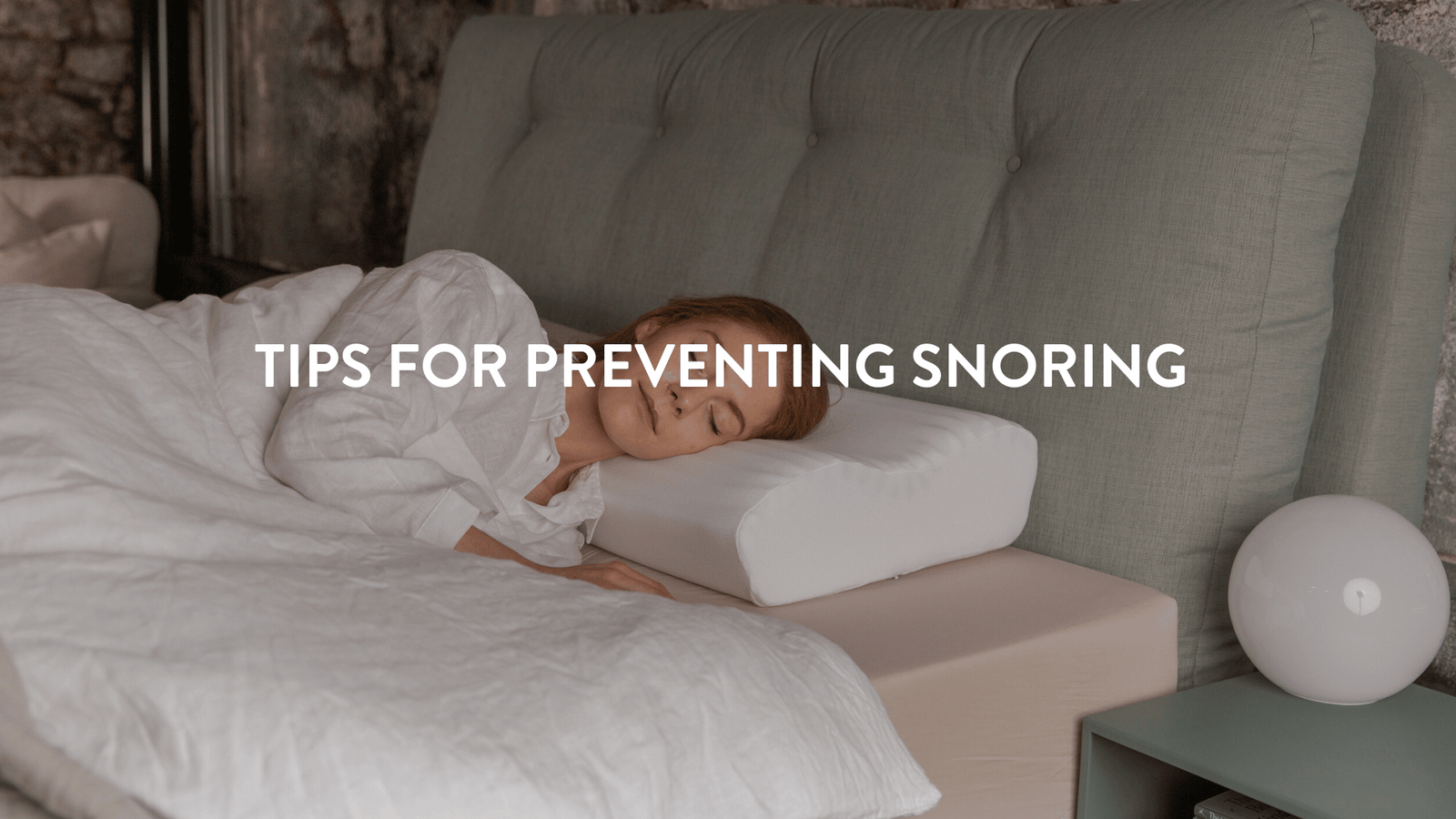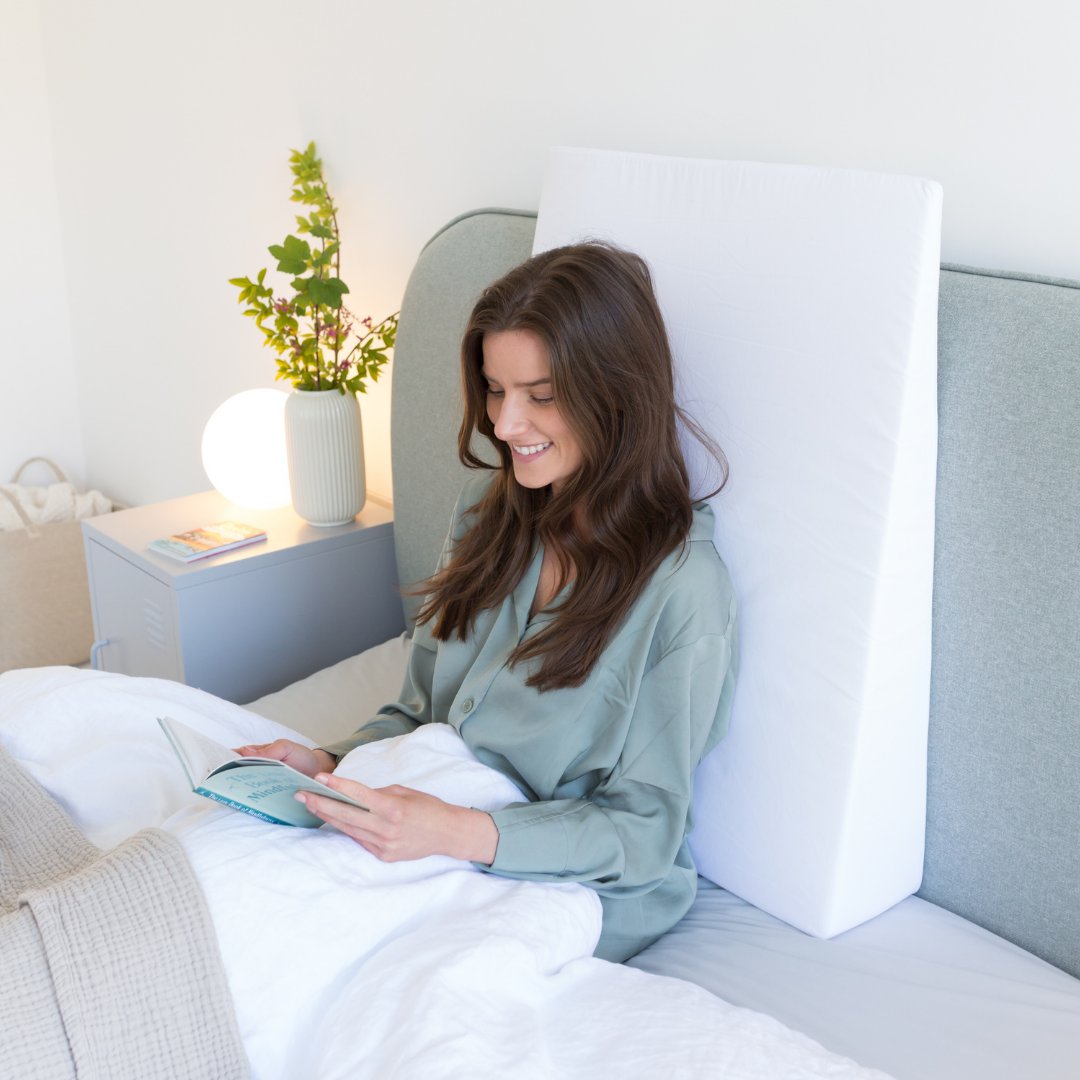
Conseils pour prévenir le ronflement
Le ronflement est un problème courant qui touche de nombreux adultes et leurs partenaires. Il ne s'agit pas seulement d'une nuisance nocturne : le ronflement chronique peut entraîner une mauvaise qualité de sommeil, une fatigue diurne et même des complications de santé telles que l'apnée du sommeil . Il a même été cité dans des procédures de divorce !
Les meilleurs spécialistes de la santé, Spire Healthcare, ont estimé qu'environ 45 % des adultes ronflent parfois, dont 25 % sont des ronfleurs réguliers !
La bonne nouvelle est qu'il existe plusieurs mesures pratiques que vous pouvez prendre pour gérer et même prévenir le ronflement. Laissez-nous vous fournir des conseils pratiques et vous montrer comment les produits Putnams peuvent vous aider à améliorer la qualité de votre sommeil.
Quelles sont les causes du ronflement ?
Le ronflement se produit lorsque le flux d'air à travers votre bouche et votre nez est partiellement obstrué pendant votre sommeil. Cette obstruction provoque des vibrations dans les tissus de votre gorge, créant le son familier du ronflement.
Les causes courantes incluent :
- Dormir sur le dos
- Congestion nasale
- Consommation d'alcool avant de se coucher
- Être en surpoids
- Faible tonus musculaire de la gorge et de la langue
- Apnée du sommeil
- Anatomie de la bouche
- Privation de sommeil
Conseils pratiques pour arrêter de ronfler
1. Restez hydraté
Une façon simple mais efficace de réduire le ronflement est de rester bien hydraté. La déshydratation peut rendre les sécrétions nasales et du palais mou plus épaisses et plus collantes, ce qui augmente le risque de ronflement. Essayez de boire environ 11 tasses de liquide par jour pour les femmes et 16 tasses pour les hommes.
2. Évitez l’alcool avant de vous coucher
Limiter la consommation d’alcool dans les heures précédant le coucher peut réduire considérablement le ronflement. L’alcool détend les muscles de la gorge, augmentant ainsi les risques d’obstruction des voies respiratoires pendant le sommeil.
Idéalement, essayez d’éviter complètement l’alcool le soir ou, à tout le moins, limitez la consommation à quelques heures avant d’aller vous coucher.
3. Maintenez un poids santé
Le surpoids, notamment au niveau du cou, peut comprimer le diamètre interne de la gorge, ce qui augmente le risque de l'affaissement pendant le sommeil et de déclenchement du ronflement. Une étude menée par le Dr Daniel P. Slaughter , oto-rhino-laryngologiste et spécialiste du ronflement, suggère que même une perte de poids modeste peut réduire considérablement le ronflement.
4. Élevez votre tête
Surélever votre tête pendant votre sommeil peut aider à garder vos voies respiratoires ouvertes. Les oreillers de soutien, tels que les oreillers compensés, sont particulièrement efficaces pour maintenir une position élevée. Putnams propose une gamme d' oreillers anti-ronflement et de cales de lit conçus pour surélever votre tête et réduire le ronflement.
5. Choisissez le bon oreiller
Les acariens et les allergènes présents dans votre oreiller peuvent contribuer au ronflement.
Pensez à remplacer vos oreillers tous les six mois et à les garder propres en les mettant dans le cycle de gonflage à air une fois toutes les deux semaines. Les oreillers anti-ronflement Putnams sont conçus pour maintenir votre tête dans la bonne position et sont fabriqués à partir de matériaux hypoallergéniques pour minimiser les allergènes.
6. Une bonne hygiène du sommeil
Il est essentiel d’établir un horaire de sommeil cohérent. Cela se retrouve dans toutes les listes « Comment arrêter de ronfler 101 » que vous rencontrez, pour une très bonne raison .
Couchez-vous et réveillez-vous à la même heure tous les jours, même le week-end. La régularité permet de réguler l'horloge interne de votre corps pour une meilleure qualité de sommeil.
Deuxièmement, créez une routine relaxante avant de vous coucher. Détendez-vous avec des activités apaisantes comme la lecture, la méditation ou un bain chaud. Évitez les écrans et les lumières vives au moins une heure avant de vous coucher pour signaler à votre corps qu'il est temps de se reposer.
Optimisez votre environnement de sommeil en veillant à ce que votre chambre soit sombre, calme et à une température confortable. Pensez à installer des rideaux occultants, des bouchons d'oreilles ou une machine à bruit blanc si nécessaire.
Avantages de l'utilisation d'oreillers anti-ronflement pour la prévention du ronflement
Différents types d'oreillers anti-ronflement peuvent jouer un rôle crucial dans la prévention ou la réduction du ronflement :
- Oreillers anti-ronflement : Ces oreillers sont conçus pour positionner votre tête et votre cou de manière à maintenir vos voies respiratoires ouvertes. Ces oreillers anti-ronflement peuvent être très efficaces comme première ligne de défense.
- Oreillers compensés : ils surélèvent le haut de votre corps, ce qui peut aider à réduire le ronflement causé par la congestion nasale et l’apnée obstructive du sommeil.
- Oreillers en mousse à mémoire de forme Contour : Ils épousent la forme de votre tête et de votre cou, offrant un soutien et un alignement optimaux.
Changements de style de vie à prendre en compte
Parfois, il faut plus qu'un oreiller pour arrêter de ronfler chez certaines personnes, comme nous l'avons déjà dit à maintes reprises : « Chaque personne est différente ». Il est donc conseillé de prendre en compte d'autres variables dans l'équation du sommeil.
1. Établissez un horaire de sommeil régulier
En vous couchant et en vous levant à la même heure chaque jour, vous pouvez améliorer considérablement la qualité globale de votre sommeil. Une routine de sommeil régulière aide à réguler l'horloge interne de votre corps, ce qui facilite l'endormissement et le maintien du sommeil toute la nuit.
2. Adoptez une bonne hygiène de sommeil
Il est essentiel de créer un environnement de sommeil réparateur. Gardez votre chambre fraîche, calme et sombre, et pensez à utiliser des rideaux occultants ou une machine à bruit blanc si nécessaire. Limiter le temps passé devant un écran avant de vous coucher peut également aider votre corps à se préparer à une nuit de sommeil réparatrice.
3. Tenez compte des allergies
Si les allergies sont à l’origine de la congestion nasale, concentrez-vous sur leur gestion efficace. Nettoyez régulièrement votre chambre et évitez l’exposition aux allergènes tels que les squames d’animaux ou le pollen. Les antihistaminiques en vente libre peuvent également apporter un soulagement, en aidant à garder vos voies nasales dégagées et en réduisant les risques de ronflement.
4. Incorporez des exercices de respiration
Des exercices de respiration ou des exercices spécifiquement conçus pour renforcer la gorge peuvent aider à réduire le ronflement. Des activités telles que chanter, jouer d'un instrument à vent ou même de simples exercices quotidiens axés sur les muscles de la bouche et de la gorge peuvent améliorer le tonus musculaire de cette zone, contribuant ainsi à la prévention du ronflement.
En appliquant ces changements de style de vie en plus des conseils pratiques déjà mentionnés, vous pouvez créer une approche globale de la gestion du ronflement. N'oubliez pas que si le ronflement persiste malgré ces efforts, il est peut-être temps de consulter un professionnel de la santé pour une évaluation plus approfondie.
Votre bien-être et la qualité de votre sommeil sont essentiels, et lutter contre le ronflement peut conduire à une vie plus heureuse et plus saine pour vous et votre partenaire.
Cela pourrait même vous amener à rejoindre une chorale locale ! Annuaire des chorales locales
Quand demander un avis médical
Si les changements apportés à votre mode de vie ne vous aident pas à ronfler ou si votre ronflement a un impact important sur votre vie ou celle de votre partenaire, il est peut-être temps de consulter un médecin. Des symptômes tels que la somnolence diurne, le halètement ou l'étouffement pendant le sommeil et des ronflements bruyants et dérangeants peuvent indiquer une apnée du sommeil, une affection qui nécessite une attention médicale.
Toute mention d’une procédure de divorce peut également être une bonne occasion d’en discuter avec votre médecin généraliste !
Obtenez de l’aide et ne ronflez plus !
Le ronflement ne doit pas perturber votre sommeil ni votre vie. En apportant de simples changements à votre mode de vie et en utilisant les bons oreillers de soutien, vous pouvez réduire considérablement, voire éliminer, le ronflement. Putnams propose une variété de produits conçus pour vous aider à passer une nuit de sommeil plus calme et plus reposante.
Prêt à passer à l’étape suivante ? Appelez nos spécialistes du sommeil pour savoir quel produit Putnams vous convient le mieux.


















Laissez un commentaire